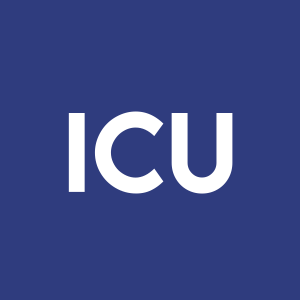Article in Nature Scientific Reports Describes Mechanism of Action of SeaStar Medical’s Selective Cytopheretic Device in the Immunomodulation of Excessive Inflammation
Rhea-AI Summary
SeaStar Medical Holding (Nasdaq: ICU) has published a peer-reviewed article in Nature Scientific Reports detailing the mechanism of action of its Selective Cytopheretic Device (SCD) in immunomodulating excessive inflammation. The study, co-authored by Angela J. Westover et al., investigates SCD's evolving approach to treating organ dysfunction caused by hyperinflammation and cytokine storms by processing leukocytes extracorporeally. Key findings indicate that SCD's low calcium blood circuit aids in the selective adhesion and transformation of activated neutrophils and monocytes, reducing inflammation and promoting tissue repair. The device has shown potential in treating chronic inflammatory conditions like chronic heart failure, cirrhosis, and chronic kidney disease, and may reduce the progression of end-stage renal disease. SeaStar Medical aims to expand SCD’s applications to other high-value, underserved clinical conditions.
Positive
- Publication in Nature Scientific Reports enhances credibility and visibility.
- SCD shows potential to treat chronic inflammatory diseases like heart failure, cirrhosis, and chronic kidney disease.
- Device demonstrated ability to reduce progression of end-stage renal disease.
- Clinical trials indicate SCD's mechanism effectively reduces excessive inflammation.
- SCD shows a shift from pro-inflammatory cells to reparative/anti-inflammatory cells.
- SCD has proven safety track record in treating acute kidney injury.
- Potential for wide application in complex clinical disorders without immunosuppression.
Negative
- Study remains in investigative stages, with full clinical efficacy yet to be proven.
- No mention of immediate financial benefits or revenue projections.
- Potential risks of adverse effects not detailed in the press release.
- Reliance on further studies to confirm findings may delay market entry.
News Market Reaction 1 Alert
On the day this news was published, ICU gained 2.28%, reflecting a moderate positive market reaction.
Data tracked by StockTitan Argus on the day of publication.
DENVER, June 07, 2024 (GLOBE NEWSWIRE) -- SeaStar Medical Holding Corporation (Nasdaq: ICU), a commercial-stage medical device company developing proprietary solutions to reduce the consequences of hyperinflammation on vital organs, announces the publication of a peer-reviewed article in Nature Scientific Reports that describes the mechanism of action of the Company’s Selective Cytopheretic Device (SCD) in the immunomodulation of excessive inflammation. “Immunomodulatory effects of a cell progressing device to ameliorate dysregulated hyperinflammatory disease states,” authored by Angela J. Westover, H. David Humes and Christopher J. Pino, (2024) 14:12747, investigated the SCD as an evolving approach to treating organ dysfunction arising from hyperinflammation and the cytokine storm by processing leukocytes in an extracorporeal circuit.
The SCD’s immunomodulatory activity is due to its effects on circulating leukocytes, specifically neutrophils and monocytes, in a low ionized calcium blood circuit. To investigate its mechanism of action, the authors used in vitro blood circuits to interrogate several aspects of the therapy. They found that activated neutrophils adhering to the SCD fibers in its low calcium environment displayed characteristics of evolving cell senescence and were subsequently released and returned to circulating blood.
According to the authors, monocytes in chronic inflammatory disorders – including chronic heart failure, cirrhosis and chronic kidney disease – appear to migrate into previously damaged tissue and transform to proinflammatory macrophages that promote further degradation. Treatment with SCD results in the selective adhesion of the more proinflammatory subsets of circulating monocytes as demonstrated by both cell surface markers and by cytokine secretory rates. Once bound, a subset of monocytes with a less inflammatory function are released back into the body over time.
“The SCD’s mechanism of action appears to be multifactorial with the progressive amelioration of circulating leukocyte activation and immunomodulation of excessive inflammation observed in clinical trials to date likely due to continuous autologous leukocyte processing,” said H. David Humes, M.D., report co-author, Professor, Division of Nephrology, Internal Medicine, University of Michigan, SeaStar Medical Scientific Advisor and SCD inventor. “This may result in less ongoing tissue injury and improved tissue repair by rebalancing damaged tissue from a pro-inflammatory to a reparative/anti-inflammatory state, and may explain the effect of SCD treatment in reducing the progression of end-stage renal disease even after dialysis-dependent acute kidney injury and multi-organ failure.”
“A dysregulated response from the body’s first responders, innate immune cells, are known to complicate the course of a number of complex clinical disorders such as sepsis, autoimmune diseases and even metastatic cancer,” said Kevin Chung, M.D., SeaStar Medical’s Chief Medical Officer. “SCD is demonstrating an ability to shift cells that mostly does more damage towards cells that help repair organs without immunosuppression, thereby opening its potential for wide application. We have a proven safety track record with SCD in treating patients with acute kidney injury with tremendous disease modifying potential and are continuing to launch studies in additional high-value, underserved clinical indications.”
About the Selective Cytopheretic Device (SCD)
The SCD is a patented cell-directed extracorporeal device that employs immunomodulating technology to selectively target proinflammatory neutrophils and monocytes during CKRT and reduces the hyperinflammatory milieu including the cytokine storm that causes inflammation, organ failure and possible death in critically ill patients. Unlike pathogen removal and other blood-purification tools, the device is integrated with CKRT hemofiltration systems to selectively target and transition proinflammatory monocytes to a reparative state and promote activated neutrophils to be less inflammatory. The SCD selectively targets the most highly activated proinflammatory neutrophils and monocytes. These cells are then returned back into the body through the blood, and the body is signaled to lower its inflammatory environment and focus on repair. This unique immunomodulation approach may promote long-term organ recovery and eliminate the need for future KRT, including dialysis.
About SeaStar Medical
SeaStar Medical is a commercial-stage medical technology company that is redefining how extracorporeal therapies may reduce the consequences of excessive inflammation on vital organs. SeaStar Medical’s novel technologies rely on science and innovation to provide life-saving solutions to critically ill patients. The Company is developing and commercializing cell-directed extracorporeal therapies that target the effector cells that drive systemic inflammation, causing direct tissue damage and secreting a range of pro-inflammatory cytokines that initiate and propagate imbalanced immune responses. For more information visit www.seastarmedical.com or visit us on LinkedIn or X.
Forward-Looking Statements
This press release contains certain forward-looking statements within the meaning of the “safe harbor” provisions of the Private Securities Litigation Reform Act of 1955. These forward-looking statements include, without limitation, SeaStar Medical’s expectations with respect to the ability of SCD to treat patients with AKI and other diseases; the expected regulatory approval process and timeline for commercialization; and the ability of SeaStar Medical to meet the expected timeline. Words such as “believe,” “project,” “expect,” “anticipate,” “estimate,” “intend,” “strategy,” “future,” “opportunity,” “plan,” “may,” “should,” “will,” “would,” “will be,” “will continue,” “will likely result,” and similar expressions are intended to identify such forward-looking statements. Forward-looking statements are predictions, projections and other statements about future events that are based on current expectations and assumptions and, as a result, are subject to significant risks and uncertainties that could cause the actual results to differ materially from the expected results. Most of these factors are outside SeaStar Medical’s control and are difficult to predict. Factors that may cause actual future events to differ materially from the expected results include, but are not limited to: (i) the risk that SeaStar Medical may not be able to obtain regulatory approval of its SCD product candidates; (ii) the risk that SeaStar Medical may not be able to raise sufficient capital to fund its operations, including current or future clinical trials; (iii) the risk that SeaStar Medical and its current and future collaborators are unable to successfully develop and commercialize its products or services, or experience significant delays in doing so, including failure to achieve approval of its products by applicable federal and state regulators, (iv) the risk that SeaStar Medical may never achieve or sustain profitability; (v) the risk that SeaStar Medical may not be able to access funding under existing agreements; (vi) the risk that third-parties suppliers and manufacturers are not able to fully and timely meet their obligations, (vii) the risk of product liability or regulatory lawsuits or proceedings relating to SeaStar Medical’s products and services, (viii) the risk that SeaStar Medical is unable to secure or protect its intellectual property, and (ix) other risks and uncertainties indicated from time to time in SeaStar Medical’s Annual Report on Form 10-K, including those under the “Risk Factors” section therein and in SeaStar Medical’s other filings with the SEC. The foregoing list of factors is not exhaustive. Forward-looking statements speak only as of the date they are made. Readers are cautioned not to put undue reliance on forward-looking statements, and SeaStar Medical assumes no obligation and do not intend to update or revise these forward-looking statements, whether as a result of new information, future events, or otherwise.
SeaStar Medical Contact:
LHA Investor Relations
Jody Cain
(310) 691-7100
Jcain@lhai.com
# # #






